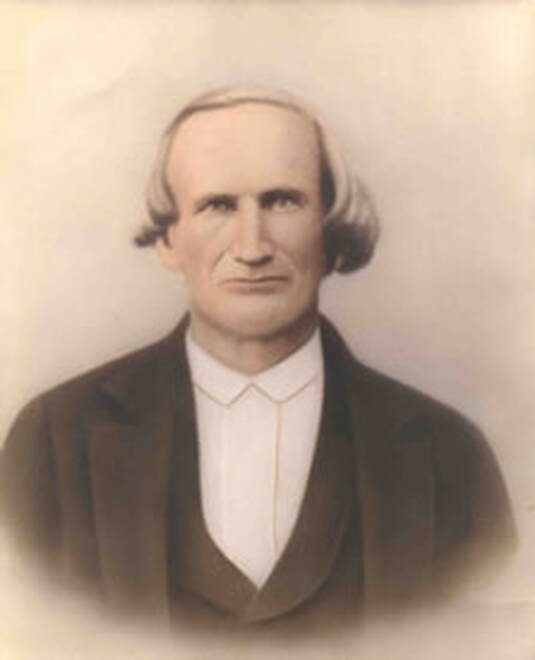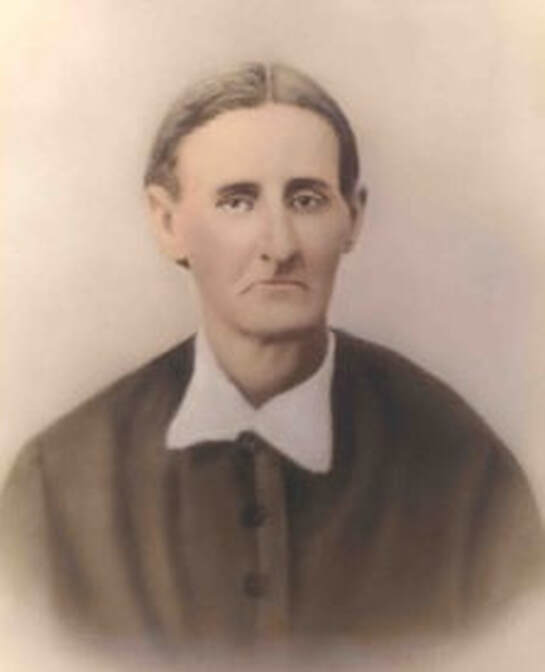William Harris was the son of John and Milly Bolling Price Harris, of Oglethorpe County, Georgia. John and Milly moved from Virginia to Oglethorpe County, Georgia in 1803 and settled in the Goose Pond area. John Harris had fifteen children, five with his first wife, Mary Walker Harris, and ten by his second wife, Milly. John was born in 1768 in Orange County, Virginia and was a son of Thomas and Sabra Harris. John died in 1821 in Oglethorpe County, Georgia. William Harris was born October 5, 1815, and was the third youngest child of John and Milly Harris.
In 1836, William moved to Walton County with his mother, Milly, at the time she came into possession of the property, which became known as the William Harris Homestead. He married Harriet Amanda Davenport in 1841. They had 12 children. From all evidence gathered from Courthouse records and from information passed down through the generations, it is clear that he was a peaceful man of character, integrity, and industry.
He was listed first in the 1840 Census as Head of Household. The 1850 Census listed him as Head of Household and named his wife and four of his children who had been born by that time, and his mother, Milly. He is listed both in the 1860 Census and the 1870 Census.
William Harris farmed his land, cared for his wife and children and was a leader in the community. In 1841 he was nominated with other Walton County citizens to represent the County at a Convention to be held in Milledgeville “to adopt such measures as may seem to them proper for dissemination of democratic principles”.
Of his children, William T, Isham Walker, Charles M., and John Lewis were farmers–all on land originally acquired by their father. Robert Sylvester became prominent as a banker and merchant in Bethlehem, and Virgil Vascar Harris became a merchant in Good Hope and Monroe.
The Harris family was listed among the pioneer residents of Walton County by Anita B. Sams in her excellent history of Walton County, Wayfarers in Walton.
The many descendants of William and Harriet Harris are peaceful, law-abiding and interested in preserving for future generations the William Harris Homestead, which represents an important link in the life and culture of the early and middle nineteenth century.
In 1836, William moved to Walton County with his mother, Milly, at the time she came into possession of the property, which became known as the William Harris Homestead. He married Harriet Amanda Davenport in 1841. They had 12 children. From all evidence gathered from Courthouse records and from information passed down through the generations, it is clear that he was a peaceful man of character, integrity, and industry.
He was listed first in the 1840 Census as Head of Household. The 1850 Census listed him as Head of Household and named his wife and four of his children who had been born by that time, and his mother, Milly. He is listed both in the 1860 Census and the 1870 Census.
William Harris farmed his land, cared for his wife and children and was a leader in the community. In 1841 he was nominated with other Walton County citizens to represent the County at a Convention to be held in Milledgeville “to adopt such measures as may seem to them proper for dissemination of democratic principles”.
Of his children, William T, Isham Walker, Charles M., and John Lewis were farmers–all on land originally acquired by their father. Robert Sylvester became prominent as a banker and merchant in Bethlehem, and Virgil Vascar Harris became a merchant in Good Hope and Monroe.
The Harris family was listed among the pioneer residents of Walton County by Anita B. Sams in her excellent history of Walton County, Wayfarers in Walton.
The many descendants of William and Harriet Harris are peaceful, law-abiding and interested in preserving for future generations the William Harris Homestead, which represents an important link in the life and culture of the early and middle nineteenth century.
The William Harris Homestead Foundation is a charitable 501(c)3 organization whose mission is to provide heritage, agricultural and environmental scholarship.


